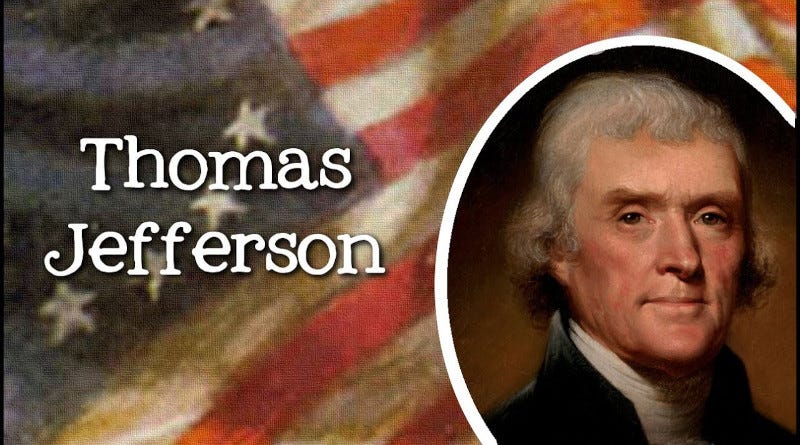Jefferson's Letter - the Tree of Liberty
In a 1787 letter to William Stephens Smith, the son-in-law of John Adams, Thomas Jefferson used the phrase "tree of liberty"...
by Garrett O’Brien, originally published 14-November-2022
Unless we learn as well as frequently revisit our own history, we have no foundation on which to move forward - solid and well-founded beliefs, good character, Spiritual and health well being, the importance of God, family, homeland all become mute points that would have otherwise save any country.
The Liberty Tree quote many attribute to Thomas Jefferson is part of a 1787 letter to William Stephens Smith, the son-in-law of John Adams, the contents of which follows (source)...
< start of Jefferson’s letter >
I do not know whether it is to yourself or Mr. Adams I am to give my thanks for the copy of the new constitution.
I beg leave through you to place them where due.
It will be yet three weeks before I shall receive them from America.
There are very good articles in it: and very bad.
I do not know which preponderate.
What we have lately read in the history of Holland, in the chapter on the Stadtholder, would have sufficed to set me against a Chief magistrate eligible for a long duration, if I had ever been disposed towards one: and what we have always read of the elections of Polish kings should have forever excluded the idea of one continuable for life.
Wonderful is the effect of impudent and persevering lying.
The British ministry have so long hired their gazetteers to repeat and model into every form lies about our being in anarchy, that the world has at length believed them, the English nation has believed them, the ministers themselves have come to believe them, and what is more wonderful, we have believed them ourselves.
Yet where does this anarchy exist?
Where did it ever exist, except in the single instance of Massachusets?
And can history produce an instance of a rebellion so honourably conducted?
I say nothing of it’s motives.
They were founded in ignorance, not wickedness.
God forbid we should ever be 20. years without such a rebellion. [1]
The people can not be all, and always, well informed.
The part which is wrong will be discontented in proportion to the importance of the facts they misconceive.
If they remain quiet under such misconceptions it is a lethargy, the forerunner of death to the public liberty.
We have had 13. states independant 11. years.
There has been one rebellion.
That comes to one rebellion in a century and a half for each state.
What country before ever existed a century and half without a rebellion?
And what country can preserve it’s liberties if their rulers are not warned from time to time that their people preserve the spirit of resistance?
Let them take arms.
The remedy is to set them right as to facts, pardon and pacify them.
What signify a few lives lost in a century or two?
The tree of liberty must be refreshed from time to time with the blood of patriots and tyrants. It is it’s natural manure.
Our Convention has been too much impressed by the insurrection of Massachusets: and in the spur of the moment they are setting up a kite to keep the hen yard in order.
I hope in god this article will be rectified before the new constitution is accepted. [2]
< end of Jefferson’s letter >
Further Sources
Monticello Podcast: Jefferson's Words: Three Letters on the New U.S. Constitution includes audio of the letter that contains this quote, as read by Bill Barker, who interprets Thomas Jefferson at Monticello and elsewhere.
Thomas Jefferson on Politics & Government: Revolution and Reformation.
References
^ This sentence has possibly been misquoted as "every generation needs a new revolution."
^ Jefferson to Smith, November 13, 1787, in PTJ, 12:355-57. Transcription available at Founders Online.
Last Note
Our Constitution was written after most of the Founding Fathers had read as many books as they could in books written on the history and effects of different governments. [3]
John Adams had ordered and shipped from Europe more than 300 books on this topic and made them available for all the Founding Fathers.
What resulted of their efforts was the need to have a Republic but functioning on a Democratic process and not Republic protocols (such as the Roman Empire).
A Democracy was rejected as immediately as it was presented as such is 50% +1 meaning the laws of the land would sway according to emotions instead of sound reasoning…
[3] They didn’t have to be concerned about the books being filtered by Liberalism as they are today as most books before 1913 provided factual evidence backed by sound reasoning and critical thinking of their perspective. Also, the publishing industry at that time didn’t require an author to include phrases and snippets from other books as selected by the publisher as well as adhere to a selected narrative (hence why independent publishing has taken on its own life in the past few decades).



